Word formation
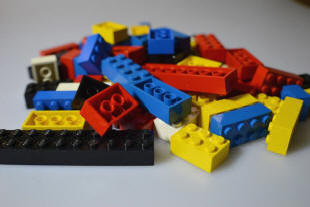 |
| building words |
 |
Making new words |
Now that you know a little about morphemes, it's time to see how we can use them to make new meanings in English. Note, the 'in English' there: languages around the world make new words in a bewildering number of ways. We focus here only on how English does this.
 |
Root and branch |
The first thing to do is distinguish between the root or base
word and the derivations that branch from it. Here's an
example of deriving words from the root word nation:
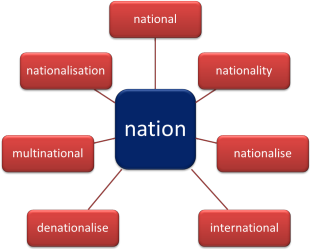
You can of course now recognise the morphemes in these words.
 |
The three main ways to make new words |
Although there are other ways to make new words in English, we'll look only at the most important three.
 |
Conversion |
This is the simplest way to make a new word but it is not always
obvious because there are no changes to the morphemes. The
most common way to do this is from nouns to verbs but there are also
other ways.
Here are some examples:
| The word ... | as in ... | can be converted to ... | by ... |
| clean (adjective) | It's a clean house | clean (verb) | by using it as a verb as in, e.g. Please clean it carefully. |
| bottle (noun) | It's a blue bottle | bottle (verb) | by using it as a verb as in, e.g. The vineyard bottles its own wine. |
| pocket (noun) | He put it in his pocket | pocket (verb) | by using it as a verb as in, e.g. He pocketed the money. |
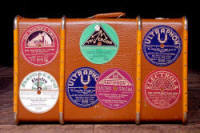 |
Affixation |
To affix simply means to stick on and, as we saw with the example
using the root nation, above, English has a variety of ways to do
this with a variety of effects.
There are two primary terms:
- Prefixation refers to adding a morpheme to the beginning of a
word. For example:
Adding the prefix un- to many words results in the opposite meaning: unpleasant, unable, unforgiving etc. - Suffixation refers to adding a morpheme to the end of a
word. For example:
Adding the suffix -ment to the end of a word changes it into a noun: achievement, discernment, disappointment.
So what is the effect of prefixes usually and
what is the effect of suffixes usually?
Click here when you have an answer.
- Prefixes usually change the meaning of a word.
- Suffixes usually change the function of a word.
That is not always the case.
Here's a brief task. Fill in the last column in your head and then click on the table for an answer.

 |
Compounding |
The final way to consider word building is to look at compounding.
This means adding words together to make new meanings. For
example:
Add house to keeper and you get housekeeper
Add play to mate and you get playmate
and so on.
Sometimes the words are joined together (dishwasher), sometimes they are
hyphenated (notice-board) and sometimes they remain separate
(cigarette lighter) but they are all treated as single ideas.
Here's a last task. What sorts of words are being joined
here?
Fill in the last column in your head and then click on the table for
an answer.

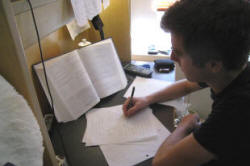 |
A revision task |
As a bit of revision, look at this table and see if you can:
- Identify the affixes
- Say what they do
The first row is done as an example.
When you have made a few notes, click on the table for the answers.
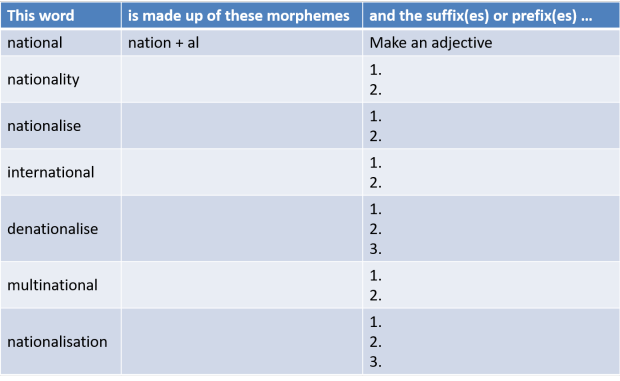
By the way, the word multinational can be used as a noun but that is not the function of the -al morpheme. It makes an adjective and then the adjective is used as a noun (by a process we saw above called conversion).
 |
Learn more about: |
 |
Take a test |
To make sure you have understood so far, try
a very short test of your
knowledge of word formation.
Use the 'Back' button to return when you have done that.
If you got that all right, it is safe to move on.
That is the end of this section of the course. If you want to know more, go to the teacher training index and select the level you want. That will take you to a contents menu from which you can select what you need.
Click here to return to the course index.
